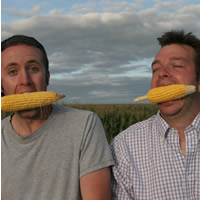Starz DocNight – King of Corn (Aaron Woolfe)
Director Aaron Woolf IN-PERSON!
DocNight shines a spotlight on the genre from all angles—the investigations it undertakes, controversies it awakens and discoveries it makes—with Q&A sessions and filmmaker receptions to follow each screening.
“King Corn” starts off a little too much like a re-visitation of “Supper Size Me,” with a sequence of fast food drive-thrus and piles of junk food. The premise is revealed by a trip to the doctor to analyze the filmmaker’s diet, and you begin to discover that corn is actually the major ingredient in America’s diet.
This is where the similarities stop and “King Corn” blows the other movie out of the water in every consideration.
Not only is “King Corn” a more compelling story than “Supper Size Me,” it is told in a way that leaves the audience intrigued and educated. The film is based on the presupposition that almost every product in modern American food markets have come in contact with corn, either as an ingredient, or as a feed stock in the case of meat.
The other link is ancestry. Two of the filmmakers’ great great grandfathers come from the same small town, Greene, Iowa, where the two travel to take a stab at growing their own single acre of corn.
While the anticipation of watching an acre of corn grow seems as unappealing in the film as it does on paper, once the two get to Iowa, the film hits its stride and captures your attention for the next 90 minutes.
What makes this film utterly enjoyable is that even though it is a film about the aversion and repugnance of American food production, the filmmakers Aaron Wolf, Curt Ellis, and Ian Cheney never take out any anger on the farmers. Rather, the film treats them with respect and dignity, and shows how these farmers have become victims of the industrialization of food production just as much as the consumers. The farmers are given the chance to tell their story, and as the audience gets to know them, they begin to appreciate them.
Unlike most documentaries this film presents beautiful cinematography. The landscape shots and pictures of rural life allow the audience to experience the pure magnificence of Middle America, which also creates an affinity for the film’s setting. With a premise that could so easily become two kids from the east coast looking down on the hicks from Iowa, the filmmakers take a higher road and show their subjects in a bright and colorful light.
This balance is both refreshing and commendable. Toward the end of the film you began to get angry and want to hold some one accountable. Up until this point the antagonist has been Henry A. Wallace, the developer of the Farm Bill under President Roosevelt. At the climax of the movie the two documentarians go and interview the aging Wallace, and here the film goes from good to truly great.
Instead of needling the old man, they tactfully let him explain his reasoning for the Farm Bill. Instead of a confrontation, there is a realization that his motivation for the bill was actually very valid, and Wallace himself seems a bit frustrated with the extent that agriculture has been industrialized.
Now without an evil politician to hang the blame on the viewer is suddenly forced to realize the blame rest on our shoulders. As consumers we are too apathetic to change how we procure our food, or question the components of the food we eat.
This is the true brilliance of this film.
Anyone can rally against the giant industrial complex and make all aspects of it seem evil. But Wolf, Ellis and Cheney challenge their audience to look at themselves, and their individual part in the system, in order to motivate the viewer into action.
The film’s website contains more than just information on the film, they provide a “Take Action” link to become educated so you can “nudge our food system in a different direction. Fortunately, there’s a lot to do!” You can read the Farm Bill itself while reviewing their six ideas of how you can take back control of your food…and your body.

